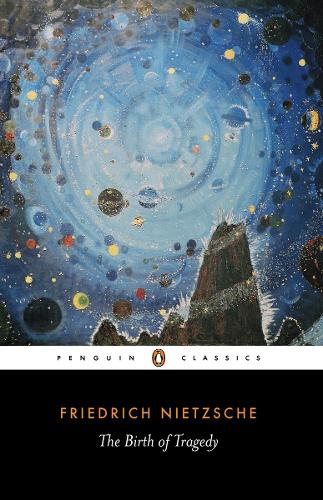The Birth of Tragedy

Ratings/reviews counts are updated frequently.
Check link for latest rating. ( 20,689 ratings, 1,207 reviews)Read More
Found a better price? Request a price match

The Birth of Tragedy
Book Hero Magic created this recommendation. While it's new and still learning, it may not be perfect - your feedback is welcome! IS THIS YOUR NEXT READ?
The Birth of Tragedy
Presents an argument for the necessity for art in life. This book is based on the author's enthusiasms for Greek tragedy, for the philosophy of Schopenhauer and for the music of Wagner. It outlines a distinction between two central forces: the Apolline, representing beauty and order, and the Dionysiac, a primal or ecstatic reaction to the sublime.
The Birth of Tragedy by Friedrich Nietzsche delves into the heart of ancient Greek culture, shedding light on its glorious artistic achievements, particularly in the realm of tragedy. In this profound exploration, Nietzsche grapples with the sombre beauty that lies within Greek tragedies, examining the interplay between two opposing artistic forces: the Apollonian, representing order and rationality, and the Dionysian, embodying chaos and passion. Through his ingenious analysis, Nietzsche endeavours to answer why tragic art, which often depicts suffering and despair, brings us profound aesthetic pleasure and a deeper understanding of existence.
Dedicated to his contemporary Richard Wagner, Nietzsche suffuses the text with his admiration for Greek literature, particularly tragic drama, along with his influences from Arthur Schopenhauer’s philosophy and Wagner's musical drama, notably "Tristan Und Isolde". The book introduces the reader to Nietzsche’s groundbreaking thesis that "only as an aesthetic phenomenon are existence and the world justified." This notion posits that life's intrinsic value and meaning are best appreciated through artistic lenses, where our experiences, even those filled with suffering, gain a form of exquisite and transcendental beauty.
First published in 1871, The Birth of Tragedy was Nietzsche’s debut work, marking the beginning of his journey as a philosopher. His distinction between the Apollonian and Dionysian spirits is a central theme, inviting readers to contemplate how these contrasting forces coalesce within tragic art to reflect deeper truths about human nature and the human condition. Nietzsche's treatise thus serves as both a painstakingly detailed study of Greek culture and a timeless meditation on the broader relationship between art and life.
The book's impact extends beyond its academic contributions; it challenges readers to look anew at the role of suffering in their own lives, transforming pain into a source of beauty and wisdom. Nietzsche’s reverence for tragedy as an art form compels us to embrace the duality of existence and find solace and meaning in the most unexpected of places.
Book Hero Magic summarised reviews for this book. While it's new and still learning, it may not be perfect - your feedback is welcome! HOW HAS THIS BEEN REVIEWED?
The Birth of Tragedy by Friedrich Nietzsche is often praised for its deep and insightful exploration of ancient Greek culture and its profound influence on Western thought. Reviewers appreciate Nietzsche's compelling thesis on the interplay between Apollonian and Dionysian elements in art and life. Some critique the book for its complexity and dense prose, but it remains highly respected in philosophical and literary circles.

Book Details
INFORMATION
ISBN: 9780140433395
Publisher: Penguin Books Ltd
Format: Paperback / softback
Date Published: 27 May 1993
Country: United Kingdom
Imprint: Penguin Classics
Contributors:
- Translated by Shaun Whiteside
- Edited by Michael Tanner
Audience: General / adult
DIMENSIONS
Spine width: 8.0mm
Width: 129.0mm
Height: 198.0mm
Weight: 123g
Pages: 160
About the Author
Friedrich Nietzsche was born near Leipzig in 1844, the son of a Lutheran clergyman. At 24 he was appointed to the chair of classical philology at Basle University, where he stayed until forced by his health to retire in 1879. Here, he wrote all his literature, including Thus Spake Zarathustra, and developed his idea of the Superman. He became insane in 1889 and remained so until his death in 1900. Shaun Whiteside has translated widely from French, German and Italian. Michael Tanner is a Fellow of Corpus Christi College, Cambridge. He is particularly interested in Wagner and Nietzsche.
Also by Friedrich Nietzsche
View allMore from Philosophy & Psychology
View allWhy buy from us?
Book Hero is not a chain store or big box retailer. We're an independent 100% NZ-owned business on a mission to help more Kiwis rediscover a love of books and reading!

Service & Delivery
Our warehouse in Auckland holds over 80,000 books and puzzles in-stock so you're not waiting for your order to arrive from overseas.

Auckland Bookstore
We're primarily an online store, but for your convenience you can pick up your order for free from our bookstore, which is right next door to our warehouse in Hobsonville.

Our Gifting Service
Books make wonderful thoughtful gifts and we're here to help with gift-wrapping and cards. We can even send your gift directly to your loved one.

































